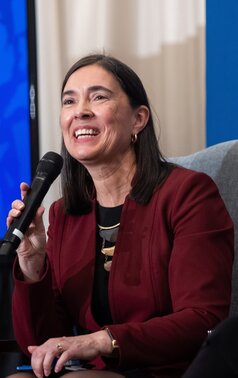
A Conversation with Justice Anita Earls of the North Carolina Supreme Court
Earls spoke about bias, judicial decision-making in politicized environments, and how voters should assess judicial candidates.
In February 2024, the Brennan Center for Justice, State Court Report, and the NYU Law Review hosted a symposium dedicated to state constitutional law. Several state supreme court justices who participated in the program sat down for brief interviews with State Court Report, which we are publishing as a series.
Justice Anita Earls was elected to the North Carolina Supreme Court in 2018. She began her eight-year term as an associate justice on the court in 2019. In her interview, Earls addressed the responsibility of state supreme court justices to remedy bias in the legal system, what judicial decision-making should look like in a highly politicized environment, and how voters who are paying increased attention to judicial elections can evaluate the candidates before them.
The following interview has been edited for length and clarity. Additional excerpts from Earls’ interview will be featured in later pieces.

Thank you so much for chatting with us today. State supreme court justices interpret their state’s constitution. What’s something that people might not know about North Carolina’s constitution?
Like many state constitutions, we have provisions that aren’t in the federal Constitution. For example, most states have some educational rights. But what I think is unique about North Carolina’s state constitution and its protection of the right to a public education is the way in which it’s put. It’s in three or four different parts of the state constitution. There’s not simply the statement that there’s a right, but also funding mechanisms.
Other state supreme courts have wrestled with, once you find a right to a base public education, if the body responsible for carrying that out is not doing it, what is the court’s role? A majority of our court ultimately ruled that we as a court could order that funds be spent by the state to get our school systems up to the level of a sound basic education.
In recent years, there have been widespread calls for stakeholders to address bias and inequality in the justice system at all levels. What responsibility do state supreme court justices have to answer that call?
In North Carolina, following George Floyd’s death, there were protests across the state, just as across the country. There were demonstrations targeting our court. Our building was damaged during a demonstration. Our chief justice at the time, Cheri Beasley, who was the first African American woman to be chief justice, held a press conference and issued a public statement acknowledging that there are racial disparities in our criminal justice system, talking about what it meant to her as a mother of two young black men. She talked about the responsibility of judges to address those issues, to acknowledge the data about racially disparate outcomes, and to look for ways to address them. Chief Justice Beasley’s profound and moving statement really captured why it was so important to address the racially disparate numbers of people of color coming through the criminal justice system.
But it had been addressed by many state courts prior to 2020. In Charlotte, for example, there was a juvenile court judge who noticed racial disparities in his courtroom. He tells the story of a particular case where there were two juveniles in trouble for the same incident. The two young men were doing the same thing, at the same time, in the same place. One was white, one was Black. They both came to court with the same community support. Both their parents were there. No factors distinguished them in any relevant way, other than their race. Yet one was being recommended for custodial disposition and the other to go home with his parents. The Black child was recommended for a custodial disposition.
The district court judge said this was so eye opening, and it spurred an effort to understand why and what to do about it. They created a project called Race Matters for Juvenile Justice, that’s been operating for about 15 years. They’ve been doing a lot of education around implicit racial bias, as well as meeting regularly to assess what progress they’re making in eliminating those kinds of racial disparities. That’s just one example.
It can’t be right that as a state court justice, you’re sworn to uphold the Constitution and the code of judicial conduct requires you to uphold the fairness and impartiality of the judiciary, and yet there’s a segment of the population that observably is having very racially disparate outcomes. To be silent about that, or to say that there’s nothing we can do about that, is not right.
Across the country we see increasing politicization of state courts. We see it in the process for selecting judges, how those judges decide cases, and how other officials in the state government interact with those courts. How does that politicization impact the development of the law?
I don’t subscribe to the notion that we used to have courts that had no political leanings and were just calling balls and strikes. But I do think that there’s a different way our courts should be operating in highly politicized states. There is room to improve our method of deliberation so the law develops in a more evenhanded way. In our court, even now, half of our decisions are unanimous, even with a highly politicized, very divided court. Sometimes it’s just clear one side is wrong, the law is clear. But in the tough cases — especially where we’re not simply saying how an established precedent applies in the new circumstance, we’re actually issuing a rule in an area where we haven’t spoken before — I think having everyone’s views represented and then finding a way that balances them is what the public deserves. That’s not the same thing as being completely unbiased or not making policy decisions. But it is an approach to resolution of a case and determination of the law that’s different than what’s happening now.
Ultimately, I believe in democracy. The answer lies with the voters. We must articulate for voters a vision of what a judiciary should look like and provide a measure for them to hold accountable the people they elect, especially in a state like North Carolina, where judges are elected. None of this can be done easily. A lot of it relies on lawyers who can translate for the public what is happening in our courts, why it matters, and how it could be different. But at the end of the day, vote.
We can talk for a long time about what systems might exacerbate the politicization of the courts and what systems might help curb it — but whatever system, whatever structure you have in place, I really believe that what matters is the integrity of the people who hold the office. And the only way to impact that in a state that elects judges is for voters to hold judges accountable and put in office people who have a demonstrated record of conducting themselves in a way that meets those ideals of being fair and impartial and not overly politicized.
What kind of information do you think could help voters assess judicial candidates?
For a statewide appellate court, you can look at how the justices vote in cases. Do they vote along party lines, or do they appear to be voting independently and not as a political bloc? It’s harder to get at because it’s not as public, but how do they conference internally? Do they have a tradition of respecting collegiality and listening to each other and truly deliberating? There’s a lot of skill that goes into being a good appellate judge that engages in true deliberation as opposed to simply counting votes. Those internal operating processes are harder for voters to know and measure, but occasionally you get a window into what’s going on.
Right now the litmus test for judicial candidates seems to be: If you lock people up, you’re good. If you let somebody out, you’re bad. And while public safety and criminal justice is certainly an important part of our work, that’s not the only criteria by which I think the voters should judge our court. What about, do you protect workers? Do you protect a clean environment? Do you protect the right to vote? Do you protect the right to a sound, basic education? What is a justice’s record on cases involving injured parties, whether that’s medical malpractice or automobile accidents or any other kind of personal injury? There are a bunch of other issues that impact people’s lives. Greater examination of how judges are voting can help voters understand their judge and ultimately decrease the politicization of the courts.
Douglas Keith is a founding editor of State Court Report and a senior counsel in the Judiciary Program at the Brennan Center for Justice.
Suggested Citation: Douglas Keith, A Conversation with Justice Anita Earls of the North Carolina Supreme Court, Sᴛᴀᴛᴇ Cᴏᴜʀᴛ Rᴇᴘᴏʀᴛ (Apr. 8, 2024), https://statecourtreport.org/our-work/analysis-opinion/conversation-justice-anita-earls-north-carolina-supreme-court.



Related Commentary
State Law Gives Litigators Extra Tools to Counter Originalism
Unique features of state courts allow lawyers to go beyond arguments available in federal courts.
The Diversity of Rights in State Constitutions
Transcript of panel from Symposium: The Power of State Constitutional Rights
A Conversation with Chief Judge Jeffrey S Sutton Court of Appeals for the Sixth Circuit
Transcript of panel from Symposium: The Power of State Constitutional Rights
Welcome
Transcript of panel from Symposium: The Power of State Constitutional Rights